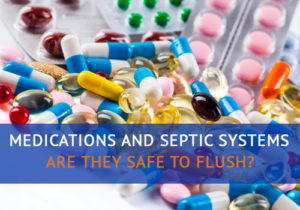We all know that there are substances that should not be flushed or put down the kitchen sink. Grease, coffee grounds, baby wipes are some of them. But, what about expired or unwanted medications? Yes, these go on the “do not flush” list too. Medications and septic systems don’t get along, even if they are “expired.”
Pharmaceuticals vs. Over the Counter Medications
So, what are we talking about when we say medications? We don’t necessarily include over-the-counter medicines. In the case of medications and septic systems, we focus on the ones that are prescribed to you by a medical professional. Examples of these are antibiotics, anti-depressants, cancer-related drugs, or painkillers.
These medications can negatively impact your septic system. Just using the bathroom while taking pharmaceuticals can be a problem. It isn’t just the act of flushing medicine down the toilet that can be harmful to your septic system.
Why is Flushing Medications Bad for Your Septic System?
 Unlike other “Do Not Flush” products, medications not only can clog your septic system, but they also harm the biological processes needed for a healthy septic system.
Unlike other “Do Not Flush” products, medications not only can clog your septic system, but they also harm the biological processes needed for a healthy septic system.
Medicines and Bacteria
Medications, like antibiotics, can kill off the healthy bacteria that you need in your septic system. Ultimately, this helpful bacteria aids in filtering the wastewater from your house for safe re-absorption back into the ground.
When wastewater leaves your house, it makes its way to the septic tank. Here is where the healthy bacteria live and thrive. In the tank, the solid waste settles on the bottom, and a layer of scum floats to the top of the wastewater. The water between these two sections is the effluent. This is where your beneficial bacteria live and thrive. The effluent then makes its way to the drain field where the bacteria continues to destroy and filter out dangerous pathogens. The soil then absorbs the effluent.
Keeping a healthy balance of beneficial bacteria means it can quickly and successfully break down the harmful waste that makes it way to your septic tank. Introducing pharmaceutical drugs into this environment can kill off the bacteria and cause your septic system to work improperly.
You should know this too – Major medications in a septic system also creates a risk of nurturing a superbug that is antibiotic resistant. And, nobody has time for superbugs!
Drugs and Water Contamination
Pharmaceuticals can also lead to groundwater contamination if absorbed into the surrounding environment. The U.S. Geological Survey has reported in an early 2000 nation-wide study that medicines and other unwanted chemicals were found in over 80% of the streams and rivers that they sampled.
This is dangerous because some of these waterways make up our drinking water. Another recent study says that over 40 million Americans are currently at risk of consuming water that is contaminated by such medication.
The bottom line? Medications and septic systems don’t mix. But, don’t worry. You can help stop these issues.
5 Tips for Preventing Problems with Medications and Septic Systems
1. Call Your Septic Company
Letting your trusted professional know that you may be putting unwanted medicines in your septic system can save you time and money. Remember: causing harm to your septic system can be as simple as taking strong pharmaceuticals over long periods of time and using your bathroom.
Luckily, the solution may be easier than you think. If you’re trying to prevent problems, your septic company may suggest adding more bacteria to your system, pumping more often, and monitoring it on a regular basis. Taking preventative measures like this can save you money.
Or, perhaps your system may already be experiencing a problem with bacterial balance or groundwater contamination. This may mean taking on a more massive project by diluting or replacing your septic tank.
2. Minimize Use of Other Products Harmful to Bacteria
These items include cleaning solutions, antibacterial soaps, bleach, “flushable” wipes and more. You don’t want to put extra stress on those beneficial bacteria.
3. Dispose of Unwanted or Unused Medications Properly at Home
When it comes to pill bottles, the FDA suggests pouring the medication into a waste receptacle, like a Ziploc bag or plastic container. Then, cover them in something unpleasant. This can be coffee grounds, liquid soap, or cat litter to name a few.
What this does is make the medication unappetizing for pets or kids. After you have made your unused medicines successfully unappealing, you can toss them in the trash.
If you’re not comfortable with this, there are other ways to dispose of unwanted medication.
4. Participate in National Drug Take-Back Day
Dispose of your medications—officially.
You can find your local Florida disposal drop off on the FDA website. There are two per year, one in April and one in October.
5. Take Unwanted or Old Medications to Local Disposal Sites
Here is a list of location in an around Clermont.
Make sure to always remove personal information from prescription bottles and other medication containers when throwing them away.
Remember that medications and septic systems don’t mix. Flushing medicines negatively impact your smaller bacterial ecosystem as well as our larger one made of streams and rivers. If you have more questions about how to fix or prepare your septic system for the introduction of pharmaceuticals, contact Advanced Septic Services, of Clermont, FL at 352-242-6100. We’re happy to help you decide what’s best for your septic needs.

